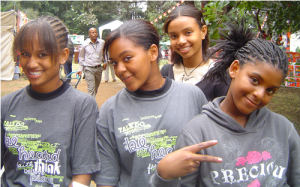Read this article on slum clearance South Africa-style written by Dan McDougall.
Red Ants beat residents of Alexandra Township with crowbars
WAVING iron bars and pickaxes, the Red Ants, a rented mob of thugs in bright red overalls and crimson helmets, used the half-light of dawn for cover as they marched into the slum. Stamping out the first cooking fires of the day with heavy boots, they spread out in a long line. Then they attacked.
Bleary immigrant women dropped plastic water containers and ran in panic towards their corrugated iron homes. “Grab the children,” they screamed.
By sunrise their shacks on the outskirts of Johannesburg had been razed. They were forced to watch as their few possessions were burnt.
The Red Ants, described as state-sponsored mercenaries by their critics, have become a growing force in the past few months as South African cities have begun a campaign of “beautification” before the World Cup begins in June. This means clearing away unsightly immigrant squatter camps.
This month, more than 100 Zimbabweans were beaten and evicted by Red Ants from a derelict building on the main road to Ellis Park stadium in Johannesburg, one of the football tournament’s main venues.
It followed a series of Red Ant evictions ordered by the provincial department of public transport along main roads within a mile of the stadium, which will host five matches. Hundreds more Zimbabweans were forcibly evicted from properties in central Johannesburg.
Red Ants also flattened more than 100 shacks within a two-mile radius of the Mbombela stadium, near the Kruger national park. Most of those evicted were Zimbabwean.
Human rights groups are warning of a return to xenophobic violence that led to the deaths of scores of immigrants during township riots in 2008.
According to Braam Hanekom, chairman of Passop, a refugee rights charity based in Cape Town, the Red Ants are doing the government’s dirty work. “They are essentially a militia that ruthlessly and forcefully displaces people from their shelters under government instructions,” he said. “They are notorious for their brutal and violent approach towards the poor.”
The ruling African National Congress regards beautification as a policy that extends beyond the building of new stadiums, roads and airports. It sees the World Cup as an opportunity to showcase its achievements since it came to power 16 years ago.
Attacks have increased on immigrants drawn to South Africa by the hope of work on projects for the tournament. And the onslaught may intensify after the World Cup. Unemployment, already at 27%, is expected to rise as thousands of construction jobs disappear. In the run-up to local elections next year, many politicians are expected to exploit fears that immigrants are “stealing” jobs.
The South African commission for human rights said it had been bombarded by claims from immigrants that they had been warned they would be “dealt with” after the tournament.
Lawrence Mushwana, the commission’s chairman, said: “African foreigners living in South Africa must brace themselves for a new wave of xenophobic attacks after the World Cup is over.”
Walter Da Costa, chairman of a migrant support group in Johannesburg, believes local authorities bear responsibility for much of the violence. Council agents pay the Red Ants and give them their distinctive uniform on a casual basis, he said.
“As they are recruited from the bottom rung of the ladder, is it surprising that their actions usually amount to little more than intimidation and terrible violence?”
Many Red Ants are drawn from vigilante groups in townships in Durban and Johannesburg which are already intent on ridding the country of immigrants. They routinely refer to migrant families as “parasites” and “cockroaches”.
“We will not stop beating them until our work is done, until they leave this land forever,” a Red Ant member in Soweto told The Sunday Times.
“It’s our land and we have the right to help the authorities move them on. If the municipality asks us to destroy these cockroaches then we’ll do that and flatten their homes to dust.”
Attacks by the Red Ants and a growing number of vigilante groups are nationwide. In the Breede Valley, in the Western Cape, more than 1,200 Zimbabwean refugees struggle to survive in a camp built on a rugby field. Many are victims of Red Ant raids in the north; others have been burnt out of their homes by hate mobs.
“I was among a few hundred Zimbabwean refugees taking shelter in the Central Methodist Church in Johannesburg when the Red Ants came and sprayed us with brown sewage water,” said Chenzera Ndbele, 14. “When we moved to a local slum with my mother they came back with pickaxes. When they forced us out they made us watch as they burnt our belongings.”
Dorcas Chinomera, 17, a refugee from Zimbabwe, recalled the day when a mob arrived outside her shanty home in De Doorns, two hours’ drive from Cape Town. “They were screaming ‘kweri kweri’ [parasites] at us. They spat in our faces and stole our furniture and burnt our home to the ground as the police looked on.”










